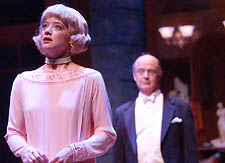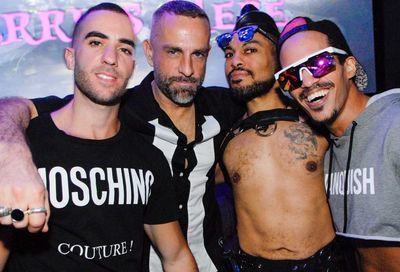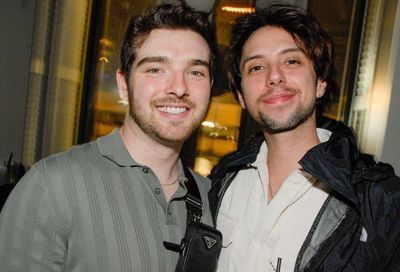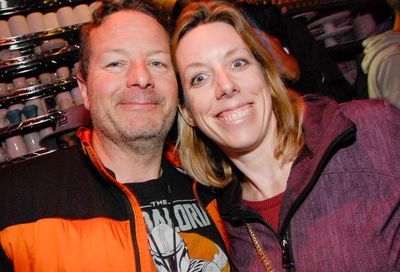Utterly Shawful
Heartbreak House at Round House Theater
You know that promising moment when you think you’ve solved a Rubik’s Cube, that annoyingly enigmatic toy straight out of the pocket-protector weird science of the ’80s? You finally line up each row of solid matching color and turn the cube on its side, only to find that one piece still doesn’t match. That is precisely what George Bernard Shaw’s Heartbreak House feels like — just when you think you understand what it is that the notorious Socialist is getting at, just when you think you know what it’s all really about, Shaw turns the characters upside down and their quarrelsome questions inside out, and bam! — there’s that streak of red with a gleaming white block smack-dab in the middle, yet another Shavian anomaly.
Round House Theatre has never shied away from producing dense, intellectually-rich classics that attract a more cultivated crowd, and conquering Shaw’s House is no easy feat. Indeed, it’s a rather daunting task to present such a problematic play that hinges on the antics of such impossibly surreal characters.
 |
“It is cultured, leisured Europe before the War, ” Shaw writes in his script, and on one particular evening in Captain Shotover’s Sussex drawing room we meet a highly stylized cast of witty, self-aware, babbling, opinionated fools. We will watch and listen to them socialize, satirize, idolize, fraternize, sentimentalize, patronize, vocalize, scandalize — and yes, even hypnotize — for the next two and a half hours, tackling everything from the working classes and the proper ordeals for businessmen to matters of the heart.
There is no plot, really. Shaw’s characters serve as vehicles for his pet socio-political sentiments: there’s Ellie Dunn, the maiden betrothed to a wealthy man more than twice her age (but alas, she is in love with her “Marcus “); Hesione Hushabye, a bohemian madame of her own accord; and Hesione’s sister, the grand Lady Utterword, who has qualified herself a prodigal daughter, returning home without the anticipated pomp and circumstance. Then, of course, there is Captain Shotover himself, a rascal of an old man who dotes about his villa offering a buoyant jest at every golden opportunity.
The rest of Shaw’s crew is just as explicit: a group of enviable, human characters who each remark on the action (what little of it there is to comment on) with searing insight and profound simplicity — and yet somehow he allows his foolish philosophers to remain blissfully ignorant of the world surrounding them, a common theme for Shaw’s brand of eccentrics. It’s a rather curious sort of comedy, to be certain.
Yet Shaw doesn’t know how to write comedies, just as clearly as he never learned how to write dramas. There are no definitions in his language, no exposition in his scenes. Instead Shaw utilizes ornate dialogue that drives home his political subtext, carefully punctuating his scenes with small doses of subliminal dialogue — never too blatant, never too obvious.
|
It isn’t until deep in the second act that Shaw finally allows his ideas to manifest when his lounging Brits gather in the backyard just before a fatal bombing raid. Here they confront their consciences in a group effort (after all, it is much too difficult a task to be left for a solo affair). Together they will offer their early twentieth-century philosophy on everything from Ellie’s arranged marriage to the inner workings of “Boss ” Mangan’s fortunes. As they contemplate convention and the demoralization of the souls of men — Englishmen to be sure — there is no mention of an impending war, no hint of fear or clue that they will soon meet very real danger. It’s a sudden attack and a blissfully-fast resolution to the conversational drone of Shaw’s lengthy questioning.
Nick Olcott must love the challenge of mounting such a rare “comedy ” in the Shaw canon, as the entire production bears the mark of a director who treats the material with adoration and a deep respect for the work. Olcott’s direction is usually solid and impressive, but his House feels a bit forced and the staging artificial, even unnatural sometimes.
With the exceptions of Emery Battis in the role of Captain Shotover and Gerry Bamman as Mangan, the language seems to overwhelm most of the other actors, who demonstrate a tendency to glaze over the poetry in Shaw’s satire, throwing away perfectly witty lines with no real grasp on his light, contrived humor. Megan Anderson doesn’t quite inhabit the principal role of Ellie Dunn, but I suspect that it may have something to do with her dreadfully inappropriate costuming — an awful pink evening gown and a silly blonde wig.
Support Metro Weekly’s Journalism
These are challenging times for news organizations. And yet it’s crucial we stay active and provide vital resources and information to both our local readers and the world. So won’t you please take a moment and consider supporting Metro Weekly with a membership? For as little as $5 a month, you can help ensure Metro Weekly magazine and MetroWeekly.com remain free, viable resources as we provide the best, most diverse, culturally-resonant LGBTQ coverage in both the D.C. region and around the world. Memberships come with exclusive perks and discounts, your own personal digital delivery of each week’s magazine (and an archive), access to our Member's Lounge when it launches this fall, and exclusive members-only items like Metro Weekly Membership Mugs and Tote Bags! Check out all our membership levels here and please join us today!






















